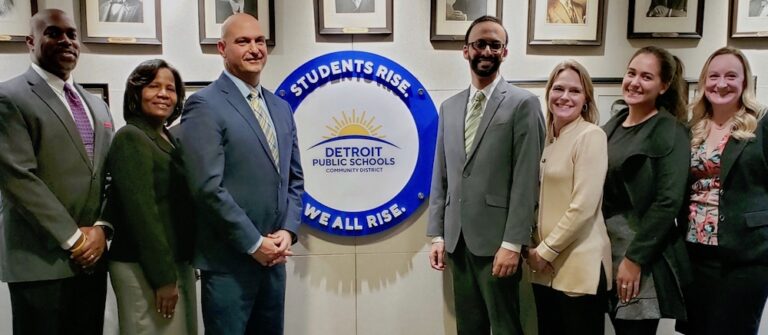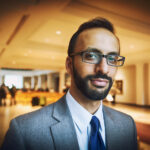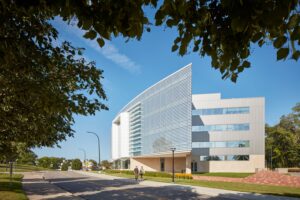
- Kim Kisner
- Business
- 04/18/2023
The GreenLight Fund - Shifting Investment Decisions to the People Involved

Rishi Moudgil leads the GreenLight Fund of Detroit, a locally driven, cross-sector, community-centered model to collectively identify critical paths to prosperity and invest in equitable social impact programs for children and families facing economic barriers in Detroit.
SBN Detroit spoke to Moudgil about the model, sustainability, and impact on Detroit residents, businesses, and stakeholders.

Q: Tell us about GreenLight Fund – what is the impetus behind it?
A: We are focused on tackling poverty and its effects on residents by investing in solutions that complement the local landscape and boost the existing ecosystem with a proven model that has had a track record in other urban areas.
We believe that for a social impact model to succeed and scale it must be aligned directly with who it serves and therefore local folks must drive the process of both determining their needs and selecting the ventures we invest in.
It comes back to the challenge of pushing into a community versus being pulled. Our unique model is pull-through.
We organize the stakeholders and local advocates to ensure that only programs that align with their needs and have high quality are brought in.
Q: What are examples of programs you’ve invested in and the outcomes?
A: A workforce program example is the Center for Employment Opportunities. We launched this in Detroit, and it offers immediate and comprehensive employment options for those who have been incarcerated.
It’s a multistage model that helps folks to gain immediate employment and put them on a path for long-term work. This dramatically reduces the human cost and financial costs of returning to the justice system. They also partner with existing organizations to shift policy measures that benefit thousands of residents to stabilize their lives and gain employment.
Another workforce program is the New Teacher Center, which provides new instructors with embedded support to enhance teaching practice and retention. This builds sustainability within their jobs and student learning gains in the classroom. The program has trained over 150 veteran teachers who mentor new teachers with evidence-based support and it’s reducing the turnover rate in the Detroit Public Schools community district.

These programs each came by a community-led process where local residents helped determine the gaps in their communities. We also then hire Detroiters to run the new programs.
Q: Relating it to sustainability and businesses in Southeast Michigan – what role does economic sustainability play in your investment strategy in Detroit?
A: The key foundation for people to prosper is a combination of economic stability and to have opportunities to advance. Workforce opportunities are critical, and in a place that has been plagued by disinvestment for so long, workforce and economic programs are not enough. We need to wrap around human services transit, housing, education, and more. There are so many topics related to creating an economic foundation for individuals and businesses.
Q: What role does environmental sustainability play?
A: We can’t have stable places to live, work and play unless the environment is stable. And low-income neighborhoods are some of the most environmentally unsound areas, so this exacerbates a host of problems that continues the cycle of poverty. But where development occurs, home ownership will follow, and thus begins the process of building a more sustainable community.
Q: Your website says, ‘Our deep connection with the community and strategic partnerships help organizations ramp up and start producing direct, meaningful change. This ongoing support enables organizations to thrive over time.’ How does this work?
A: What we are doing is shifting an approach of social investing to both trusting residents directly and developing stronger outcomes. We rely on residents to choose their destinies. We raise unrestricted capital from partners around the city and hand the funding decisions back to local stakeholders. Deep and ongoing trust is the key ingredient toward achieving the best outcomes.
After we launch, we hold a seat on their board, shepherd additional partners and resources, and help create a path of success.
Q: How do you account for ROI in your investments?
A: We are completely focused on social ROI, as are all of our social investment recipients. We co-develop social impact metrics with both our communities and organizations before we begin operations so there is a clear set of performance outcomes we all agree on.
Each organization has a set of outcomes that we all pull together toward achieving, and we know that if these goals are achieved then we are achieving the goals desired by our stakeholders.
Q: What’s the largest hurdle you face?
A: The biggest challenge is the people and families that have been in some of our neighborhoods the longest have received a disproportionate brunt of the disinvestment. There is no silver bullet. Multiple efforts need to be tackled over the long term. We have to be honest about how we all got here and have difficult conversations about race and gender and inequality.

So, one of the largest hurdles is alignment. Are the solutions properly aligned to the true needs of the people and planet and are they sustainable to create lasting change over time.
Q: How do you see the city’s Sustainability Action Agenda aligning with the work you are doing?
A: We are completely aligned with the agenda and believe we need integrated action. This means centering people and the planet simultaneously. We can no longer isolate variables and expect progress. Sustainability and social impact goals must be front and center as we build toward the future.
Be sure to subscribe to our newsletter for regular updates on sustainable business practices in and around Detroit.
Kim Kisner
- All
- Business
- Community
- Education
- Events

The Chip Bag Project, based in Detroit, is a sustainability initiative that upcycles hard-to-recycle snack packaging — particularly chip bags — into insulated sleeping bags for individuals experiencing homelessness. Founded by Eradajere Oleita, the project addresses both environmental waste and housing insecurity by transforming materials like Mylar into practical, thermally efficient solutions. In June, Oleita was among Trelllis’s 30 Under 30, its annual recognition of the brightest young...

PowerPanel, headquartered in Oxford, focuses on sustainable energy technology with a particular emphasis on hot water systems and thermal energy capture. The company designs and manufactures modular solar hybrid systems that integrate both photovoltaic and thermal components into a single unit. Its goal is to offer energy solutions that are more efficient, durable, and economically viable for a range of commercial and industrial applications. SBN Detroit interviewed Garth...

The Detroit VA Healthcare System is implementing a systemwide sustainability strategy through its Green Environmental Management System (GEMS), designed to reduce waste, lower energy consumption, and improve operational efficiency. The program recently earned Practice Greenhealth’s “Top 25 Environmental Excellence Award.” Through coordinated efforts across departments and a commitment to innovation—particularly in high-resource areas like dialysis—the Detroit VA works to demonstrate how environmental stewardship and clinical care can go...







